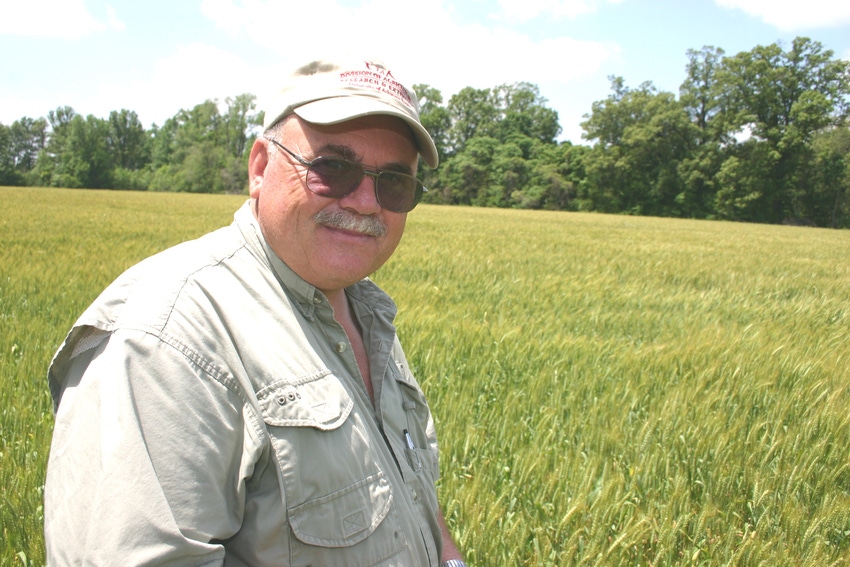
Robert Goodson has just finished checking on a couple of soybean verification fields outside Turkey Scratch, Arkansas.
“So far, so good,” says the Phillips County Extension agent as a stiff, late-May breeze riffles his shirt. “The soybeans are at V-2/V-3. We’ve got another verification field in rice that was just planted last week.”
As in much of the Delta, planting season has often been a rainy, nervous affair for many producers in Phillips County.
“Right now, we’re probably around 75 percent finished planting soybeans and a bit late. The corn was planted later than normal because it’s been so wet here. We still have producers trying to plant rice.
“Everything is late, actually -– probably at least a couple of weeks. But things have turned around and on a scale of one to 10, we’re at an eight. It’s not a disaster by any means.
“Earlier in the planting season some folks were very worried about getting corn in. And the window is definitely closing for corn planting. There are only a handful of days left to get seed in the ground.”
The corn that has been planted looks fine, says Goodson. “The corn acreage in the county is way down from the 60,000 we had (in 2013). We’ll probably have half of that this year so it’s still a substantial crop.”
All other crops are showing good stands. “There have been very few replants other than where there’s been some herbicide drift.”
Area gins will be unhappy that the dropped corn acres will not be going to cotton. “Cotton will likely be our smallest crop at around 4,000 acres. Soybeans and rice are what has really picked up. I think the price of rice is pushing producers to really consider it.”
More rain and cool temperatures the week of May 12 “slowed the crops down. It especially affected the rice, which just isn’t growing off as fast as it should. But let’s look at the positive: it’s nice to have the moisture.”
How did the wheat come through all the rain?
“Wheat really dislikes a wet foot and that may mean yield loss in some fields. Overall, I’d say the crop is average or a touch better. I’d estimate the wheat crop at 50 to 55 bushels per acre.”
Currently at dough stage, Goodson expects the wheat crop will be ready for harvest in about three weeks.
Weed resistance, irrigation
Resistant weeds continue to bedevil the county.
“We’re like everywhere else in the Delta -- can’t shake them. We actually picked up a new resistant weed, mayweed, in our wheat this year. Harmony isn’t giving us good control of mayweed at the recommended rate. Mayweed is basically a winter weed and it’s showing signs of becoming more of a problem.
“I’ve been looking at resistant pigweeds -- a huge kink in our fields -- all morning. After what I saw, I’m afraid I’ll have to shoot some of my silver bullets at them and that’s a bad thing this early.”
Some county producers have done “some of the zero tolerance approach” to pigweeds in the past. “I’d love for everyone not to have a single pigweed out there. But hoe hands are hard to find and herbicides are the fallback.”
There will be hoe hands out this summer. “Some farmers are already lining up crews, trying to find high-schoolers willing to do the hard work. And it isn’t an easy job – few folks are willing to do it in the heat.”
Goodson is among the group of Extension agents urging producers to try an irrigation scheduling program. “We’ve had 25 to 30 attending each of the three PHAUCET training sessions we’ve held. Right now, there are 10 producers in the county using the program in their fields. That accounts for 3,000 to 4,000 acres in water conservation. That may not seem like much but last year we had none.
“I expect that PHAUCET use will only grow. If I can save water on my farm, I can save energy and that means I’m taking more to the bank. It just makes sense to use the program.”
Overall, Phillips County is much luckier than other areas of the state with water. “We certainly don’t have the water table issues they do in the Grand Prairie. The Mississippi (River) is at our back door.
“However, just because that’s the case, we still have to be vigilant. Any regulations coming from the state -- and the regulations are coming -- won’t stop at the White River or edge of the Grand Prairie. In the future, we’ll be in the same boat regarding water conservation issues.”
About the Author(s)
You May Also Like




